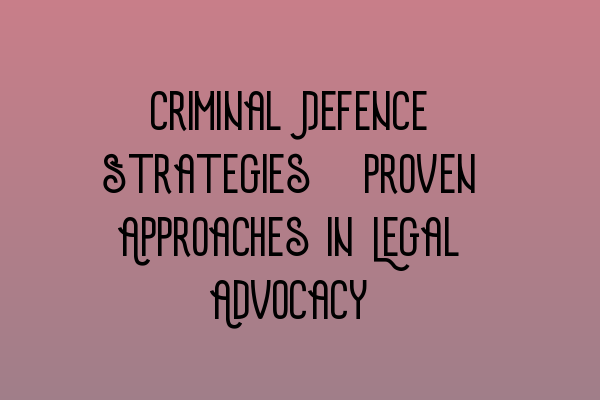Criminal Defence Strategies: Proven Approaches in Legal Advocacy
At SQE Criminal Law & Practice Law UK, we understand the importance of employing effective defence strategies in criminal cases. Our team of experienced solicitors has a wealth of knowledge in navigating the intricacies of criminal law and providing strong legal advocacy for our clients.
When it comes to criminal defence, having a solid strategy in place is essential. This blog post will explore some proven approaches that our solicitors employ in their legal advocacy to ensure the best possible outcome for our clients.
The Importance of Preparing for Trial
A key element of a successful defence strategy is thorough preparation. Our solicitors leave no stone unturned when it comes to gathering evidence, interviewing witnesses, and examining all available facts related to the case. This approach allows us to build a strong defence and challenge the prosecution’s arguments effectively.
In preparing for trial, our solicitors may utilize various techniques such as:
- Expert Witnesses: We work with a network of expert witnesses who can provide professional opinions and testify in court to support our clients’ defence.
- Investigation: Our team conducts extensive investigations to uncover any inconsistencies or flaws in the prosecution’s evidence.
- Legal Research: We stay up-to-date with the latest legal developments and precedents to strengthen our arguments and challenge the validity of the prosecution’s case.
By employing these strategies, we aim to present a strong and convincing defence in court.
The Role of Negotiation and Plea Bargaining
In some cases, it may be beneficial to negotiate with the prosecution to achieve a favorable outcome without going to trial. Our solicitors are skilled in plea bargaining and can navigate these negotiations to potentially reduce charges or penalties for our clients.
During the negotiation process, we take into account various factors such as:
- Evidence Strength: We assess the strength of the prosecution’s evidence and use this as leverage in negotiating a plea deal.
- Mitigating Circumstances: We highlight any mitigating circumstances that may have led to the alleged crime, potentially influencing the prosecution’s willingness to negotiate.
- Prosecution’s Case Weaknesses: We identify weaknesses in the prosecution’s case and use them strategically to secure more favorable terms in the plea bargain.
Our solicitors are adept at finding the right balance between negotiation and trial, always keeping our clients’ best interests in mind.
Utilizing Specialized Defences
Depending on the circumstances of a case, our solicitors may employ specialized defences to challenge the prosecution’s case. Some common defences include:
- Self-Defence: If the client acted in self-defence or in the defense of others, we present evidence to support this claim.
- Insanity: We may argue that our client was not mentally capable of understanding the consequences of their actions at the time of the alleged crime.
- Mistaken Identity: We investigate and present evidence to prove that our client was not the person responsible for the alleged crime.
By employing these specialized defences, our solicitors aim to cast doubt on the prosecution’s case and secure a favorable outcome for our clients.
At SQE Criminal Law & Practice Law UK, we are committed to providing our clients with the best possible legal representation. Our solicitors are experienced in employing effective defence strategies, backed by thorough preparation, negotiation skills, and specialized defences. If you require expert criminal defence representation, contact us today.
Related Articles:
- SQE 1 Practice Exam Questions
- SQE 1 Practice Mocks FLK1 FLK2
- SQE 2 Preparation Courses
- SQE 1 Preparation Courses
- SRA SQE Exam Dates
